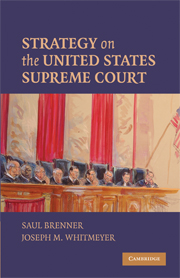Book contents
- Frontmatter
- Contents
- Preface
- PART I INTRODUCTION
- PART II CERTIORARI
- PART III THE CONFERENCE VOTE ON THE MERITS
- PART IV THE MAJORITY OPINION AND OTHER OPINIONS
- PART V THE FINAL VOTE ON THE MERITS
- PART VI CONCLUDING CHAPTERS
- 14 Strategies in Pursuit of Institutional Goals
- 15 Summary
- Appendix 1 Decision Making on the United States Supreme Court
- Appendix 2 Additional Questions to Explore
- References
- Table of Cases
- Index
15 - Summary
Published online by Cambridge University Press: 05 June 2012
- Frontmatter
- Contents
- Preface
- PART I INTRODUCTION
- PART II CERTIORARI
- PART III THE CONFERENCE VOTE ON THE MERITS
- PART IV THE MAJORITY OPINION AND OTHER OPINIONS
- PART V THE FINAL VOTE ON THE MERITS
- PART VI CONCLUDING CHAPTERS
- 14 Strategies in Pursuit of Institutional Goals
- 15 Summary
- Appendix 1 Decision Making on the United States Supreme Court
- Appendix 2 Additional Questions to Explore
- References
- Table of Cases
- Index
Summary
In Chapters 5 through 14 of this book we have explored whether the justices on the Court behave strategically. What have we discovered? We first examine the evidence that the justices are not behaving strategically:
In cases granted cert by the Court, reverse-minded justices do not vote in accord with the outcome-prediction strategy. Affirm-minded justices in the aggregate do so, but only about half of the individual affirm-minded justices pursue this strategy. In cases denied cert by the Court, the justices do not vote in conformity with this strategy (Chapter 5).
Even though Chief Justice Burger, at times, voted insincerely and with the majority at the conference vote on the merits, there is no evidence that the associate justices on the Court voted this way (Chapter 6).
Although we identified some possible strategic reasons for justices changing their votes between the conference vote and the final vote, the justices almost always shift their votes for nonstrategic reasons, for example, because they have changed their mind regarding which outcome they favor or because they were in the minority at the conference vote and wish to conform to the majority (Chapter 7).
Successful bargaining over the content of the majority opinion between the majority opinion writer and the other members of the conference coalition took place in less than 6 percent of situations on the Burger Court (Chapter 8).
Majority opinion coalitions usually are not minimum winning (MW) (Chapter 9).
The majority opinion is usually not written at the ideal point of the median justice on the Court, even when that justice is a member of the conference coalition (Chapter 10).
[…]
- Type
- Chapter
- Information
- Strategy on the United States Supreme Court , pp. 161 - 166Publisher: Cambridge University PressPrint publication year: 2009



